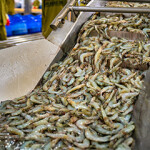Frozen category offers “unprecedented opportunity” to boost US seafood consumption

Frozen seafood sales have skyrocketed in the United States due to changing public consumption patterns caused by the coronavirus outbreak, and category analysts are suggesting seafood suppliers double down on that trend.
Sales of frozen seafood products increased faster than all other frozen food categories for the week ending on 24 May, 2020, compared to a year ago, according to Information Resources Inc. (IRI) data presented by 210 Analytics Principal Anne-Marie Roerinkin a webinar hosted by the National Fisheries Institute.
Frozen seafood sales surged 62.6 percent for the week ending on 24 May, while volume increased 55.7 percent. As a comparison, processed poultry sales rose 47.2 percent while meat climbed 38.2 percent. And 66 percent of American consumers bought frozen seafood during the pandemic, with 8 percent classified as first-time buyers, IRI found.
“This is an unprecedented opportunity to take advantage of new consumers in the category, who are looking for different things to try,” said Greg Jeffers, director of supply procurement for Gloucester, Massachusetts, U.S.A.-based seafood supplier Gorton’s.
People are cooking from scratch more, which is a huge opportunity for seafood, according to Roerink.
“Most meal occasions moved to the home," she said. "We have a lot more people around the table because colleges were closed, schools were closed, and people were working from home."
More people have been trying frozen seafood because they are likely more comfortable preparing it themselves at home, Jeffers said.
“Historically, they are scared to cook seafood at home or don’t,” Jeffers said. “Now, after three months, a lot of people have gotten a lot better at cooking. Is there any opportunity to change that perspective that seafood is tough to cook at home?”
Gorton’s consumer research also shows that household penetration is up and some of those are people trying frozen seafood for the first time, Jeffers said. One of the key ways to target shoppers that are new to the category is social media communication, he said.
Between 5 and 26 April, seafood sales rose 45.6 percent, according to IRI. They jumped 66 percent for the week ending on 5 May, 65 percent for the week ending on 10 May, 61 percent for the week ending on 17 May, and 62.6 percent for the week ending on 24 May.
The May sales spikes coincided with a tighter supply of fresh meat, Roerink noted. Nontheless, Roerink said she expects frozen seafood retail sales to continue to soar in the near future. Frozen seafood has a strong household penetration of 78.5 percent of households who buy it two or more times per year, according to Roerink. It also features an average annual consumer spend of USD 64.67 (EUR 57.60) and an average repeat rate of 75 percent, IRI found.
Eighteen percent of consumers said they would buy more frozen food in the next 12 months, while 32 percent will be buying “somewhat more,” and 38 percent will be buying about the same, according to American Frozen Food Institute data.
Because retailers are extremely busy currently and have cut back on SKUs, they are reviewing fewer new products, Roerink said. However, seafood suppliers can “lead with the strength that seafood has shown: these strong sales numbers [and] the health benefits."
“Make the case for continued innovation," Roerink urged seafood suppliers in attendance at the webinar. "Frozen food has done a tremendous job in reinventing itself."
Another great selling point for seafood is that meat prices have been very high, Roerink said. I the coming weeks and months, frozen seafood products will be featured on the front page of supermarket chain circulars, Roerink said, since meat is not being featured there as much currently due to shortages.
“Frozen has been a value-driven purchase for many years," Roerink said. "here are items that are more expensive, but there are prices for everyone."
Photo courtesy of Anne-Marie Roerink






Share